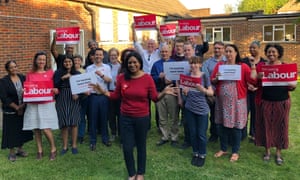Running for parliament is a steep learning curve, full of challenges, and this week brought the most personal one yet: whether to attend a hustings where far-right characters who have brought their vile agenda to my south London constituency would be on the same platform.
The byelection in Lewisham East is just two days away. But Labour said it would not attend tonight’s event because its candidate is unwilling to share a platform with these candidates. There were no such qualms in the 2015 election, when the outgoing MP, Heidi Alexander, appeared at the same hustings as Anne Marie Waters. But Waters – representing the For Britain party in this byelection – was Ukip back then, and the mainstream parties were not only willing to debate with Ukip but to impersonate its policies in an effort to win back votes. The Conservatives, too, will be avoiding tonight’s debate – apparently due to a diary clash.
I share the sentiment that far-right views are dangerous and that there is no room for them in our community. But my concern is that the explanation Labour has given plays into the hands of those who oppose our tolerant, diverse and open society.
Don’t get me wrong. It is extraordinarily painful for me, as a black woman, to share a stage with these people. But it is just as painful to watch Labour and the Conservatives dodge it, when it was their politics that supported her in the first place.

I stood at a bus stop and asked residents in Lewisham whether I should show up to the hustings. I spoke to everyone who was willing – old and young, black and white, male and female – and I was struck by the consensus among them. All but one said I had to show up and make a stand – otherwise it could win. They wanted me and the other candidates to take on this hate – and, crucially, to win the argument, and expose the cruelty that underpins it. One guy said to me: “We don’t have the luxury of no-platforming … so why should they?”
I agree that the best way of defeating the far right is to confront it, because refusing to engage doesn’t solve anything for the people who have to navigate it daily. The ugly, small, incoherent, fearful ideology that lies behind it needs to be exposed for what it is. And Labour and the Conservatives have a special responsibility to do this, since these latest political formations have been fuelled by some of the decisions of the UK’s two biggest parties: in recent years both parties have chosen an approach of absorbing what political benefits they can from these fringes – polluting the mainstream and making the fringes more toxic in the process.
Take Brexit: the EU was the scapegoat for dissatisfaction caused by government policies. Whatever the issue – economics, immigration, welfare, crime – Brussels was to blame. Labour and the Conservatives failed to tackle that narrative, and at times encouraged it, because that let them off the hook: what could they do in the face of mysterious Brussels directives? This strategy started to get out of control, Ukip’s support grew and suddenly the referendum was upon us. But rather than changing course, the two main parties doubled down.
For both, it was easier to ape Ukip’s rhetoric than to challenge the false narrative behind it. The easy option was to blame the EU and absorb some of Ukip’s support into their own ranks; the difficult option for the main parties was to address why people felt left behind, and own up to their collusion in austerity. Guess which they chose. It may have boosted their standing in the opinion polls, but our country has paid the price – with economic prospects uncertain, and the political extremes emboldened. Women and minorities have paid the highest price of all.
I don’t want migrants, or black people or Muslims to be blamed for a moment longer. I grew up in Swaziland, in the shadow of apartheid South Africa, and I have seen the lasting damage of bigotry and division. I have also seen the power of a movement of people who challenge it.
Two of my reasons for running for parliament were to show the other parties some leadership where they are falling short, and to be visible – as a woman, as a person of colour, as an LGBT person, and as an outsider. The reason that I am showing up tonight is because of the one person who told me I shouldn’t. A young Muslim girl, no more than 14 years old, said: “Be careful. If you make a mistake, everyone will blame us.” The hateful ideology that caused her fear must be challenged and defeated.
• Mandu Reid is the Women’s Equality party candidate for Lewisham East